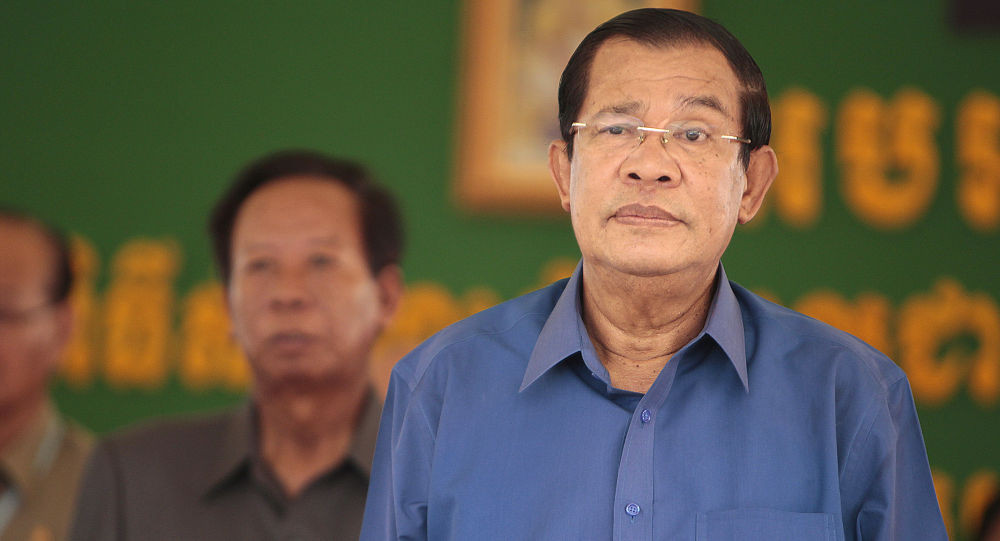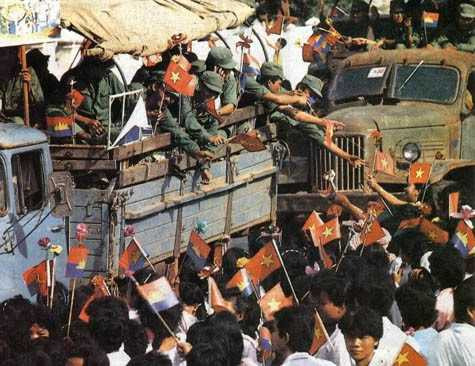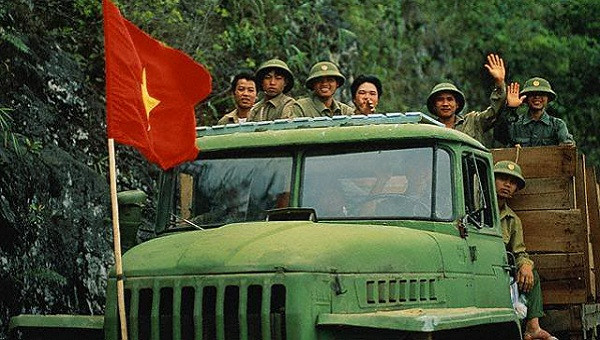Cambodian Prime Minister Hun Sen: "Vietnamese soldiers are Buddhist army"
Without Vietnam's help, Cambodia would not exist today. Cambodian Prime Minister Hun Sen has repeatedly affirmed this about Vietnam's blood sacrifice to save a nation in turmoil due to its genocidal policy, the People's Army newspaper quoted him as saying.
More than 40 years ago, in April 1975, a genocidal regime was formed throughout Cambodia. The whole country turned into "zero": no freedom of movement, no freedom of assembly, no freedom of speech, no freedom of belief, no freedom of education, no freedom of marriage, no spending money, no trading, no temples... In less than 4 years in power, the Khmer Rouge regime led by the Pol Pot-Ieng Sary group killed more than 3 million people, turning Cambodia into a prison, a giant hell.
 |
| Cambodian Prime Minister Hun Sen. Photo: Sputnik |
In the historical documentary "Marching towards national salvation" produced in 2017, Prime Minister Hun Sen recounted that, faced with that situation, he decided to flee to Vietnam to ask for help in organizing a resistance movement to liberate the country. At that time, he learned that a number of Cambodians had also left their homeland to seek refuge in Vietnam. He trusted Vietnam because it was a neighboring country that had shared hardships and stood shoulder to shoulder with Cambodia in the struggle against the common enemy for independence.
In June 1977, he and four others escaped through the jungle to Vietnam. The day he met the first Vietnamese people was also the first time in many months that he and his comrades had a full meal, because the daily food rations in Cambodia at that time were only porridge.
"Vietnam treated the refugees and us very humanely, even though they didn't know who we were, friend or foe. We were also provided with food. Knowing that we smoked, they provided us with cigarettes. We were lucky because we met all kind-hearted people. It's hard to distinguish between people from one country crossing the border of another while there was an armed conflict caused by Pol Pot. It was not clear whether we were friends or foes, but Vietnam treated us like that. That's enough to understand."
With the efforts of key Cambodian cadres to build up their forces and the effective assistance of Vietnam, Group 125 - the predecessor of the Cambodian revolutionary armed forces for national salvation, with Mr. Hun Sen as Commander-in-Chief, was established on May 12, 1978. Later, the Central Committee of the Cambodian United Front for National Salvation was established on December 2, 1978, with Mr. Heng Somrin as Chairman. This was the core of the revolutionary forces and revolutionary armed forces, marking a new development step of the Cambodian revolution.
|
| Image of Vietnamese troops in Cambodia in 1979. Photo: Internet |
Responding to the urgent call of the Cambodian National United Front for National Salvation, and also to exercise their legitimate right to self-defense to protect their sacred Fatherland, the Vietnamese Volunteer Army soldiers did not hesitate to sacrifice, fighting with their Cambodian comrades to preserve the majestic ancient Angkor temples, so that the magical Apsara dance could blend with the Vietnamese folk song full of love "Love each other, take off your clothes for each other", saving the Cambodian people from the disaster of genocide, leading to the victory of the Cambodian revolution on January 7, 1979.
"We can ask, in this world, which country has helped the Cambodian people, especially liberating them from the Pol Pot genocidal regime and preventing their return? The answer is the Vietnamese people and army. The Cambodian people believe that only fairies and Buddha can save people when they are in dire straits. Right when the Cambodian people were about to die, and could only clasp their hands and pray to fairies and Buddha to come to their rescue, the Vietnamese volunteer army appeared. The Vietnamese army is the Buddhist army," Prime Minister Hun Sen affirmed when attending the inauguration ceremony of the historical site of the establishment of Group 125 in Dong Nai in January 2012.
 |
| The affection between Vietnamese soldiers and Cambodian people. Photo: vnmilitaryhistory. |
After the victory on January 7, 1979, if according to the original plan, Vietnamese troops would withdraw from Cambodia in 1979. However, at that time, Cambodia was not strong enough to resist Pol Pot and needed time to consolidate its forces and restore its economy. If Vietnam withdrew its troops and Pol Pot returned, more Cambodians would be killed.
"The Vietnamese government did not want to leave troops behind. We asked them to. Then we agreed, they would try to reduce their forces in 1982. The Vietnamese government would reduce the number of troops, and we would increase ours."
Along with military operations, Vietnam has sent many experts to help Cambodia build a grassroots government, provide material support, and help restore the economy from the ruins left by the genocidal regime. Talking to two journalists, Harish C. Mehta and Julie B. Mehta, Prime Minister Hun Sen said that Vietnamese experts "give us opinions and let us, the Cambodian people, make our own decisions."
"Foreign advisers come to Cambodia - if we do not listen to them - they will threaten to cut off aid to us... They treat us like the masters of Cambodia. They say Vietnam occupied Cambodia, but in reality, Vietnam has done many good things for us. Vietnam is generous to us. Vietnam's most important role is to prevent the Pol Pot regime from returning. As for politics, it is the Cambodian people who make decisions," Prime Minister Hun Sen stated.

